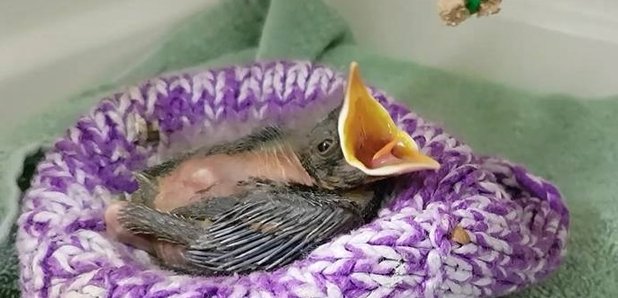What to do if you find a baby bird
30 April 2019, 16:50 | Updated: 30 April 2019, 16:58

It's the time of year eggs start hatching, and the RSPCA are bracing themselves for calls about baby birds out of their nest.
Last year they had 1200 calls from across our region about baby birds, but not all of them needed rescuing.
The charity has released advice so people understand the difference between a nestling and a fledgling.
In simple terms, nestlings have no feathers or very few. But most fledglings have all or most of their feathers and leave the nest just before they can fly. Unlike nestlings they can also perch, hop and walk.
If anyone spots a nestling, they need assistance and should be taken to a vet, a local rescue or they should call the RSPCA. Fledglings can usually be left alone but if a fledgling is injured or has been attacked or appears to be orphaned or separated from their parents, people should call the RSPCA for help.
The RSPCA's Scientific Officer Evie Button says: ''It's wonderful that people want to do the best for our wildlife, but sometimes it's difficult to know when to intervene and when to hold back.
''The first step is to identify whether the young bird is a nestling or fledgling. Nestlings are baby birds that have no feathers, or very few. Because they will not survive long outside the protection of the nest, these very young birds should be taken to a vet, or a local wildlife rehabilitator. If neither is available, the RSPCA's emergency line can be reached on 0300 1234 999.
''We also provide advice on how to safely catch, handle and care for the nestling until it can be taken to an expert.
''Fledglings on the other hand have all or most of their feathers and leave the nest just before they can fly. Unlike nestlings they can also perch, hop and walk. If one is seen away from the nest, it should be left alone and watched from a distance for up to two hours to ensure the parents are returning. It is likely the parents are nearby and will still be feeding the bird.
''We advise never to try to return a bird to the nest as this may disturb the other young birds and may be illegal. If a fledgling is in immediate danger, it should be placed in a sheltered spot a short distance away.''
For more information, visit the RSPCA's webpage and look at 'Found a Baby Bird'.
Concerns about animals should be reported via the RSPCA's hotline on 0300 1234 999.






















